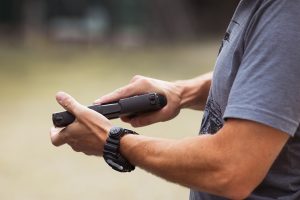
About Brian and Adam:
Brian Johnson has been carrying concealed since he was 21, with a family dedicated and trained to carry as well. He has continuously pursued increasing his training and education in the firearms world to achieve mastery.
Adam Painchaud, formerly Vice President of Sig Sauer, is one of the most highly-regarded, small unit tactics and advanced firearms skills instructors in America and the world. Adam is the driving force behind E3 Firearms Association.
Mastering Safe Passage with Firearms: A Guide for Travelers | Safe Passage with Firearms
Safe passage with firearms is essential for concealed carry (CCW) holders traveling across state lines. The federal Safe Passage law offers protections, but varying state regulations can complicate compliance. This article, drawing on expertise from the E3 Firearms Association, explores how to travel legally and safely with firearms. We’ll cover federal guidelines, state laws, and practical strategies. Our big idea: with proper safe passage with firearms, you can travel confidently while staying within the law.
The Federal Safe Passage Law
The Firearms Owners’ Protection Act (FOPA), specifically 18 U.S.C. § 926A, governs safe passage with firearms. It allows legal gun owners to transport unloaded firearms in a locked, hard-sided case through states, provided they’re lawful in both origin and destination. Ammunition must be stored separately, ideally in a locked box. However, this protection applies only during continuous travel with minimal stops.
A lesser-known fact: some states view Safe Passage as a defense, not a guarantee, risking temporary detention. The concealed carry reciprocity guide from E3 Firearms Association clarifies related legal nuances. Understanding FOPA is crucial for compliance.
[](https://pages.e3firearmsassociation.com/chmain)
Navigating State-Specific Laws
State laws create a patchwork for safe passage with firearms. For example, Texas permits open carry without a license, while New Jersey enforces strict permit requirements. Reciprocity agreements vary, with some states honoring out-of-state permits and others, like California, rejecting them. Therefore, research each state on your route to avoid violations.
Moreover, prolonged stops in restrictive states can nullify Safe Passage protections. The E3 Firearms Association’s situational awareness resource stresses proactive planning for legal travel. Checking state laws ensures you stay compliant on the road.
Strategic Travel Planning
Smart planning enhances safe passage with firearms. Map your route to avoid states with strict laws, like New York, where even compliant travelers face scrutiny. For instance, plan fuel or meal stops in gun-friendly states like Tennessee. Also, minimize detours, as extended stays can weaken Safe Passage claims in court.
A hidden tip: use apps with school zone alerts, as federal law bans firearms within 1,000 feet of schools. The range preparation guide from E3 emphasizes foresight, applicable to travel. Strategic stops keep you legal and safe.
Securing Firearms for Travel
Proper storage is vital for safe passage with firearms. Use a hard-sided, locked case, not a glovebox or soft bag. In vehicles without trunks, like SUVs, secure the case out of reach, ideally bolted down. For example, a steel lockbox in the cargo area adds protection. Store ammo in a separate locked container.
The E3 Firearms Association’s active shooter training article highlights secure gear practices, relevant for travel. A pro tip: attach a luggage tag to your case for easy identification if seized. Secure storage prevents legal issues.
Handling Police Encounters
During a traffic stop, stay calm to ensure safe passage with firearms. Disclose your firearm only if state law requires, and keep hands visible. For instance, Ohio mandates immediate disclosure, while Florida doesn’t. However, avoid debating Safe Passage with officers, as roadside arguments rarely help.
The E3 Firearms Association’s firearms instruction resource emphasizes clear communication, useful for police interactions. A subtle insight: carry a printed FOPA summary to clarify your rights. Respectful conduct reduces risks during stops.
Training for Legal Travel
Training builds confidence for safe passage with firearms. Courses on legal carry teach you to navigate state laws and police encounters. For example, practicing firearm storage ensures compliance under stress. Additionally, understanding reciprocity agreements prevents accidental violations in unfamiliar states.
The E3 Firearms Association’s smart gun technology article explores tracking tools, useful for travel security. Their modular systems guide also covers adaptable gear for travel. Training prepares you for any scenario.
Community Support for Travelers
Joining a community like the E3 Firearms Association enhances safe passage with firearms. Experts like Adam Painchaud share practical travel advice, from route planning to legal compliance. For instance, their SIG P320 off-duty program discusses secure carry, relevant for road trips.
Furthermore, the lighting solutions guide suggests tools for checking storage at night stops. Engaging with peers provides route tips and legal insights, making travel safer. Community support is invaluable for CCW holders.
Alternatives to Driving
If driving seems risky, consider shipping firearms via UPS or FedEx to your destination. Use a licensed dealer for transfers, ensuring compliance with state laws. Alternatively, flying, as covered in E3’s free firearms magazine, requires a locked case in checked baggage. Both options bypass state law complexities.
The Women on Wednesday series discusses travel logistics, offering practical tips. A lesser-known fact: some shipping services allow GPS trackers in gun cases for security. Alternatives simplify safe passage with firearms.
Next Steps for CCW Holders
To excel in safe passage with firearms, follow these steps. First, study state laws and reciprocity. Next, secure a hard-sided lockbox. Then, plan your route carefully. Finally, join the E3 Firearms Association for expert support. Their blog is a great resource.
Your call to action: prepare your travel plan today and explore E3’s insights. Stay legal, stay safe. For more firearms resources and insights, be sure to visit: https://www.e3firearmsassociation.com/blog/.
External Resources
- NRA Institute for Legislative Action – Updates on firearms laws.
- Bureau of Alcohol, Tobacco, Firearms and Explosives – Federal firearms regulations.
- USCCA – Travel and gun safety resources.
- 18 U.S.C. § 926A – Safe Passage law text.
- Giffords Law Center – State-by-state firearms laws.
